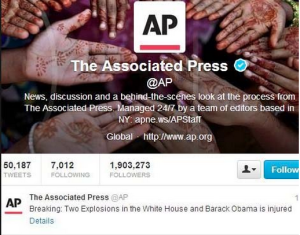
Do you feel safe online? Sharing personal information over the internet has become something that many of us do without thinking about who’s on the other end of our online connection (or at least who’s intercepting the information we send). I do it every day in the form of online banking, insurance, trading stocks, etc. If my information gets intercepted, it would be bad . . . for me.
But what about the media itself? What if the news agencies we rely upon are hacked? How would we know who was controlling the flow of information?
Today provides a PRIME EXAMPLE of what could potentially go wrong. The Associated Press’ Twitter Account (yes, their Twitter account) was hacked. The hackers falsely reported two explosions in the White House and that President Obama had been injured.
And yes, there were adverse consequences. As reported by Zero Hedge, in response to this “news,” over $20 billion worth of S&P 500 futures contracts traded in a mini-crash. In other words, the hackers managed to tank the stock market with a hack job that gave them access to less than 160 characters.
I’m not sure whether to blame the algorithms that read headlines and trade the markets, the programmers behind the software, the Associated Press hackers, or the fact that we all seem to be putting a lot of faith in things we don’t really know much about (e.g. who is behind the “news”). But a couple things are certain, we need to be skeptical about what we read and careful about the information we send over the internet.
There’s a couple reasons for that. The most compelling, in my opinion, is that information could be being gathered today for future use against us in ways that are completely beyond anything we might anticipate today. Don’t think that’s possible? Pick up an Isaac Asimov book or just read this CNN article on the impending Surveillance State.
